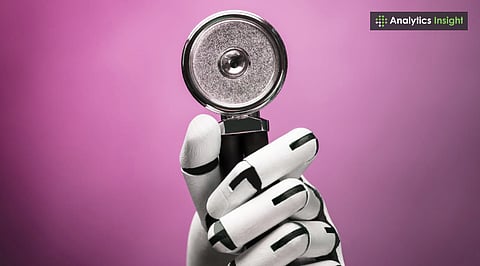

AI stethoscopes enable the detection of heart and lung issues with greater precision than traditional methods.
They allow faster diagnosis, saving time for both doctors and patients.
This technology bridges the gap between traditional healthcare tools and modern AI innovation.
The stethoscope has historically represented doctors and healthcare practices since its inception. For over 200 years, it has played an essential role in auscultation of the heart and lungs. Today, in this age of artificial intelligence, this traditional instrument is rapidly evolving into a stronger diagnostic device.
The AI stethoscope has enabled physicians to diagnose disease with greater precision, rendering healthcare delivery faster, more accurate, and highly efficient. AI stethoscopes offer a tremendous leap forward in modern medicine and patient care.
An AI stethoscope is similar to a traditional one, but it operates differently. It utilizes sensors and software to monitor your heartbeat and detect breathing sounds. Tech then analyzes these sounds and matches them to sound patterns from tons of other recordings. This helps it identify potential health issues.
This enables doctors to assess a patient's health status quickly. Instead of relying solely on their ears, doctors combine their expertise with the machine's findings.
Also Read: AI in Healthcare: How Smart Tech is Helping Fight Antibiotic Resistance
AI stethoscopes are remarkable because there are doctors that have the ability to make a more accurate diagnosis on patients. Normal stethoscopes rely solely on the doctor's ability to hear things and even the most seasoned professional is capable of missing things fairly easily. Artificial Intelligence can identify those minor variations in sound that may be an early indication that you may be getting sick.
For instance, a doctor might miss a slight heart flutter or the start of a lung issue. However, an AI stethoscope can detect these issues and alert the doctor promptly. This helps catch diseases early, which makes treatment more likely to succeed. Understanding the AI Stethoscope cost helps hospitals plan better investments.
The role of AI Stethoscope in healthcare is crucial for early and accurate detection. AI stethoscopes are good for both doctors and patients.
More Accurate Diagnoses: Doctors can make more informed decisions with AI's assistance.
Saves Time: You can skip some tests because the device can diagnose quickly during a check-up.
Find Things Early: It can find problems like heart murmurs, asthma, or pneumonia early on.
Better Access in the Sticks: In areas without specialists, these stethoscopes can save lives by providing reliable results to general practitioners.
One of the best features of the AI stethoscope is that it continues to learn. Every time it's used, it gets better at spotting diseases. The more hospitals use it, the better it gets.
This also enables the creation of medical databases worldwide. If data is shared, AI can help doctors worldwide diagnose rare or complex health problems more effectively.
AI stethoscopes are already being tested in different places. In busy hospitals, they reduce waiting times by checking patients quickly. In rural areas, they allow general doctors to identify heart and lung problems without needing a specialist immediately.
Medical students are also training with AI stethoscopes. This device provides immediate feedback, highlighting the differences between normal sounds and those that aren't. It makes learning way more interactive.
Although AI stethoscopes are beneficial, they still have some limitations.
Cost: Good AI stethoscopes can be expensive, making them less accessible in poorer areas.
Training: Doctors need education to use them correctly.
Privacy: These devices collect patient information, so strong security measures need to be in place.
Trust: Some healthcare professionals might be hesitant to rely too heavily on AI, preferring traditional methods.
As technology continues to decrease in cost, it is likely that AI stethoscopes will be widely available for use in hospitals and clinics, perhaps even becoming part of normal check-ups, similar to blood pressure monitors.
In the future, AI stethoscopes may even link right to your mobile phone or cloud accounts, making it incredibly simple to share results with a doctor. With telemedicine, this can bring good healthcare to the most remote places.
Also Read: Modernizing Healthcare Through AI and RPA
The AI stethoscope is not just a better medical tool - it's changing how healthcare works. Using AI tech with a reliable medical tool helps doctors diagnose conditions faster and spot them sooner.
Comparing AI Stethoscope price in India gives insight into accessibility and adoption. This could significantly impact healthcare, even though it's not perfect. However, the pros outweigh the cons, making this AI stethoscope quite helpful.
1. What is an AI stethoscope?
An AI stethoscope is a smart device that uses sensors and artificial intelligence to analyze heart and lung sounds.
2. How does an AI stethoscope help doctors?
It provides accurate analysis, helps in early disease detection, and supports better diagnosis.
3. Can AI stethoscopes detect heart problems?
Yes, they can identify irregular heartbeats, murmurs, and other cardiac issues at an early stage.
4. Are AI stethoscopes useful in rural areas?
Yes, they give general doctors advanced diagnostic support where specialists are unavailable.
5. What are the main challenges of AI stethoscopes?
High cost, data privacy concerns, and the need for proper training are the key challenges.
